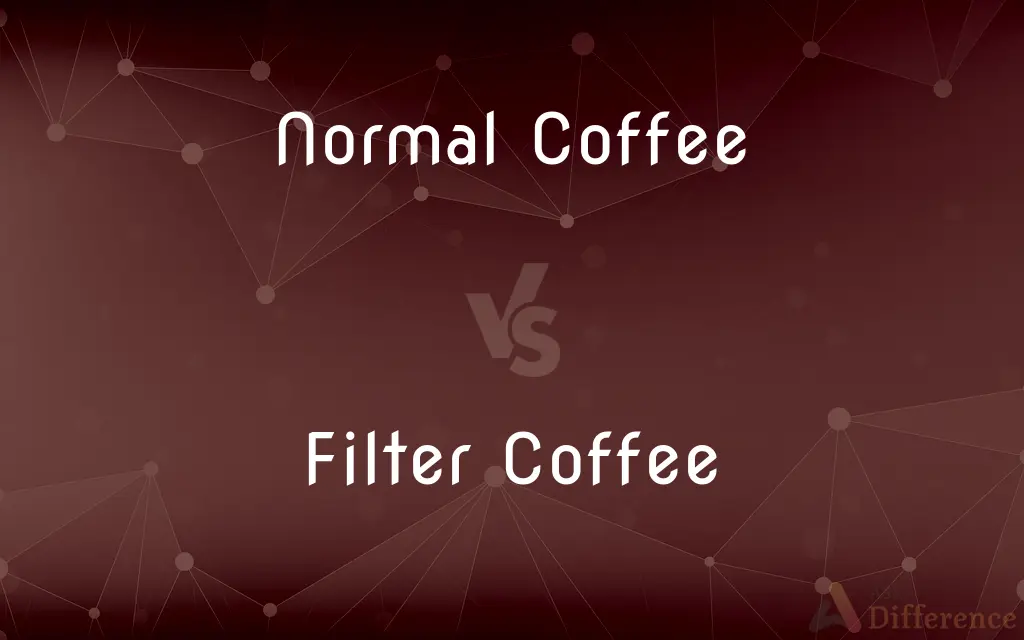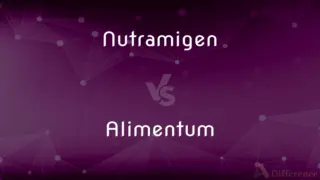Normal Coffee vs. Filter Coffee — What's the Difference?
By Tayyaba Rehman — Published on January 24, 2024
Normal coffee typically refers to a regular brew using various methods, while filter coffee, specifically, is made by passing hot water through ground coffee held in a filter.

Difference Between Normal Coffee and Filter Coffee
Table of Contents
ADVERTISEMENT
Key Differences
Normal coffee, a general term, encompasses a variety of brewing methods, including espresso, French press, and instant coffee. Filter coffee, also known as drip coffee, specifically involves brewing coffee by dripping hot water through coffee grounds held in a filter.
The brewing time for normal coffee varies based on the method; espresso takes seconds, while a French press might take a few minutes. Filter coffee usually has a longer brewing time, as water slowly passes through the coffee grounds, extracting flavor and aroma over several minutes.
In terms of equipment, normal coffee can be made with espresso machines, stovetop pots, or even without any special equipment for instant varieties. Filter coffee requires specific equipment like a drip coffee maker or a manual pour-over setup with a paper or metal filter.
The flavor profile of normal coffee varies widely, from the strong, concentrated taste of espresso to the milder flavor of instant coffee. Filter coffee typically has a clean, clear taste, with a lighter body and more nuanced flavors, depending on the coffee grounds used.
Normal coffee's caffeine content can vary dramatically, with espresso having a high concentration per volume, while other methods have less. Filter coffee generally has a moderate caffeine content, consistent with its slower extraction process.
ADVERTISEMENT
Comparison Chart
Brewing Methods
Various methods like espresso, French press
Drip brewing through a filter
Brewing Time
Varies, from seconds to minutes
Generally longer, slow drip through grounds
Equipment
Espresso machines, stovetop pots, no equipment
Drip coffee makers, pour-over setups
Flavor Profile
Varies widely
Cleaner, clearer taste with nuanced flavors
Caffeine Content
Varies, often higher in methods like espresso
Generally moderate, consistent with extraction
Compare with Definitions
Normal Coffee
Diverse Flavors: Offers a wide range of taste profiles.
Normal coffee can be strong or mild, depending on the preparation method.
Filter Coffee
Specific Brewing Method: Involves passing water through coffee grounds in a filter.
Every morning, I savor the rich aroma of freshly brewed filter coffee.
Normal Coffee
Broad Category: Includes various brewing methods.
I enjoy normal coffee, whether it's an espresso or a simple instant brew.
Filter Coffee
Longer Brewing Time: Takes several minutes to brew.
The slow process of making filter coffee gives me a moment of peace.
Normal Coffee
Variable Caffeine: Caffeine content is not consistent.
Depending on the method, my normal coffee can have varying levels of caffeine.
Filter Coffee
Special Equipment Required: Uses drip coffee makers or pour-over setups.
My kitchen counter features a dedicated space for my filter coffee setup.
Normal Coffee
Varied Equipment: Can be made with different tools.
Making normal coffee is convenient, as I can use anything from a machine to just hot water.
Filter Coffee
Moderate Caffeine Content: Generally has a consistent, moderate caffeine level.
Filter coffee provides me with just the right amount of caffeine to start my day.
Normal Coffee
Flexible Brewing Time: Brewing time varies greatly.
My morning routine includes normal coffee, sometimes quickly made with an espresso maker.
Filter Coffee
Nuanced Flavor Profile: Known for its clean and clear taste.
The subtle notes in my filter coffee are perfect for a relaxing afternoon.
Common Curiosities
What's the main difference in taste between normal and filter coffee?
Filter coffee usually has a cleaner and clearer taste, while normal coffee's flavor varies widely based on the brewing method.
Is filter coffee stronger than normal coffee?
Not necessarily; filter coffee typically has a moderate caffeine content compared to some stronger methods like espresso.
Can I make filter coffee without special equipment?
No, you need specific equipment like a drip coffee maker or a pour-over setup for filter coffee.
Is espresso a type of normal coffee?
Yes, espresso is a type of normal coffee, known for its concentrated flavor and quick brewing process.
Is it cheaper to make normal coffee or filter coffee?
The cost varies; however, normal coffee methods like instant coffee can be cheaper than filter coffee.
What is considered normal coffee?
Normal coffee generally refers to any regular coffee made using various brewing methods.
Can I make cold brew with filter coffee methods?
Yes, you can make cold brew using filter methods, though it's a different process than hot filter coffee brewing.
Can instant coffee be categorized as normal coffee?
Yes, instant coffee falls under the broad category of normal coffee.
Does the water temperature matter for filter coffee?
Yes, the ideal water temperature for filter coffee is around 195°F to 205°F for optimal flavor extraction.
How long does it take to brew filter coffee?
Brewing filter coffee typically takes several minutes, as water slowly drips through the coffee grounds.
Does filter coffee have more caffeine than drip coffee?
The caffeine content in filter coffee is generally moderate and comparable to standard drip coffee.
Do I need a paper filter for making filter coffee?
Yes, making filter coffee typically requires a paper or metal filter.
Which is quicker to make, normal coffee or filter coffee?
Normal coffee can be quicker to make, especially methods like instant coffee, compared to the longer brewing time of filter coffee.
Is filter coffee better for health than normal coffee?
The health benefits depend on various factors like the amount of coffee and additives; the brewing method alone doesn't determine health benefits.
What kind of coffee beans should I use for filter coffee?
Medium ground coffee beans are typically used for filter coffee for the best flavor extraction.
Share Your Discovery

Previous Comparison
R vs. RStudio
Next Comparison
Nutramigen vs. AlimentumAuthor Spotlight
Written by
Tayyaba RehmanTayyaba Rehman is a distinguished writer, currently serving as a primary contributor to askdifference.com. As a researcher in semantics and etymology, Tayyaba's passion for the complexity of languages and their distinctions has found a perfect home on the platform. Tayyaba delves into the intricacies of language, distinguishing between commonly confused words and phrases, thereby providing clarity for readers worldwide.











































